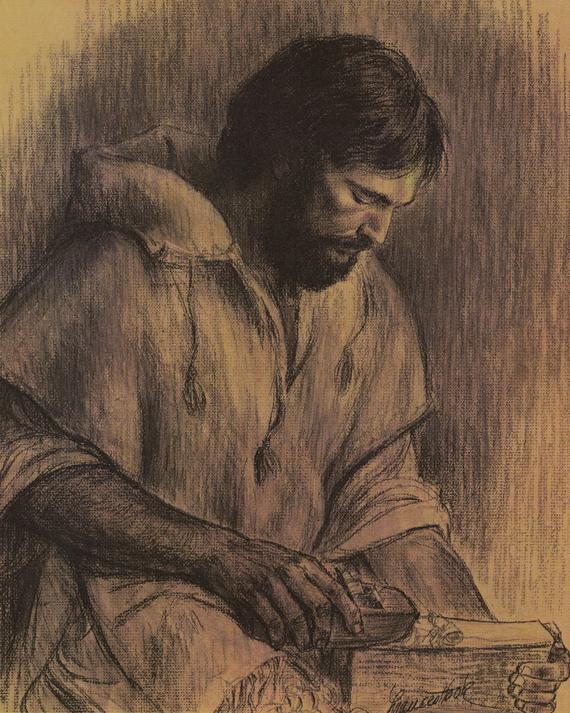|
“May the words of my mouth and the meditation of our hearts be acceptable to you, O Lord, my rock and my redeemer.” (Ps 19:14) The other day I emailed my daughters to let them know that they should think about getting a refund for one of the Christmas gifts they gave me. I mentioned that the gift was broken, that it hadn’t worked since I received it. The gift was a pair of socks. On the bottom of one sock it reads, “If you can see this,” and on the bottom of the other it says, “Bring me a cup of tea.” Well, I’ve had my feet up a couple of times already wearing those socks around the house and Sharon never, not once, ever bothered to bring me a cup of tea, and I know darn well that she could see what was printed on my socks. So obviously the socks must be broken. We all know that’s not the way things work. That’s what makes the socks funny rather than Sharon beating me up every time I wear them and point out that I’m expecting my cup of tea. This is probably also why Sharon is away for a girls’ weekend in Boston today. You can only take so much of this. It’s not only what we believe, it’s not only what we claim, it’s not only what we hope, it’s what we do that makes things happen. But the two can’t be completely separated either. Our aspirations hopefully drive our actions. They inspire us. And this is where faith and church feed each other. What our faith believes gives us the motivation for our church to act, and in turn, the life of the church inspires what we believe. Think about the story in today’s Gospel of Jesus’ baptism. We don’t know much of anything about Jesus’ life before He goes public. The oldest Gospel, Mark’s, does refer to Jesus as a carpenter. This implies that as Jesus reached the age of young adulthood He was still a working man up in the village of Nazareth in the area called Galilee. He’s not satisfied though. He knows He’s called to do something else, something more, but if we allow ourselves to be honest with the story, Jesus doesn’t seem to know exactly what that something else is. It’s winter. It’s going to be a cold 70 degrees outside this January afternoon. But if you get the chance when it does get colder and you want to sit inside with your “bring me a cup of tea” socks on, think about grabbing Christopher Moore’s book Lamb. It was recommended to me by a couple of clergy friends at the last Conference Annual Meeting in November. I was skeptical before I started reading it. I was skeptical as I started reading it. But it turned into an actual eye-opener. It’s a fanciful tale. It’s even a bit mischievous in the way it treats Jesus’ story. But its intent is right on the mark. It brings out the human nature in Jesus so that it is not completely overshadowed by Jesus’ divine nature. Again, it’s a fanciful story, but when it’s read with a background context of the Gospel stories, it helps the reader to wonder again at the amazing journey for Jesus of Nazareth to reach the realization of who He really is and what He is called to do. The story emphasizes that while Jesus was always faithful in the search, it was never easy or obvious. This struggle to find meaning led Jesus out of His carpentry shop in Nazareth and brought Him out into the wilderness of Judea to a group of seekers who had gathered around a strange prophetic character everyone was calling John the Baptist.
John, as we mentioned during Advent, left behind a privileged life as a Jerusalem priest. He traveled out into the desert because he was disgusted with the ways of the world. And there he preached about a coming kingdom that was going to force out the old order so that the new could come barging in. Jesus walked away from His old life and literally walked all the way from Nazareth to Judea, about a five-day journey, just to be a part of this community of seekers. This is why we can’t make light of Jesus’ spiritual journey. It wasn’t simple and straight-forward. It was laboured. All of this had taken place before Jesus asked to be baptized by John. This is important to remember because of the revelation that occurs at His baptism. The Father in heaven speaks: “‘This is my Son, the Beloved, with whom I am well pleased.’” The bewilderment of “my Son, the Beloved” drives Jesus further out into the desert where He will stay for 40 days, but that’s a story for Lent, not for now. What I want to speak about today is that Jesus hasn’t even started to do the work of His public ministry. He hasn’t preached one word, performed one miracle, called one disciple, and yet the Father is well pleased. The Father is pleased because Jesus has made Himself open and available to the work that will be done. Sometimes we may forget that the first step in doing the work of God is to make ourselves available to God. It’s not enough to think about what we can do. It’s to trust what we can do with God. The church, just like John the Baptist, is an alternative to the way the world is. The church is a place for seekers who believe in something different. We’re called here just like the crowds were called to come out to John. God is pleased not only with what we accomplish, but with our willingness to make ourselves available. Nothing we do as church is small or inconsequential. It is the work of God. It’s not like putting on my tea-socks and waiting for the tea to come to me. The work of God begins when are willing to go to God and to be open to what He would have us do. Not only what we think we can do, but what becomes possible when we trust in what God can do with us and through us. May we all make ourselves available for the work of God so that God may be well pleased with us, His sons and daughters. In Jesus’ name we pray. Amen.
0 Comments
Leave a Reply. |
NewsFaith, love and chitchat. Categories
All
Archives
June 2024
Follow
|
|
SERVICE TIMES
Sunday 9:30-10:30am Children Sunday School 9:30-10:30am Nursery care available during worship DONATE Make a single or recurring contribution by clicking here |
FOLLOW
|




 RSS Feed
RSS Feed
